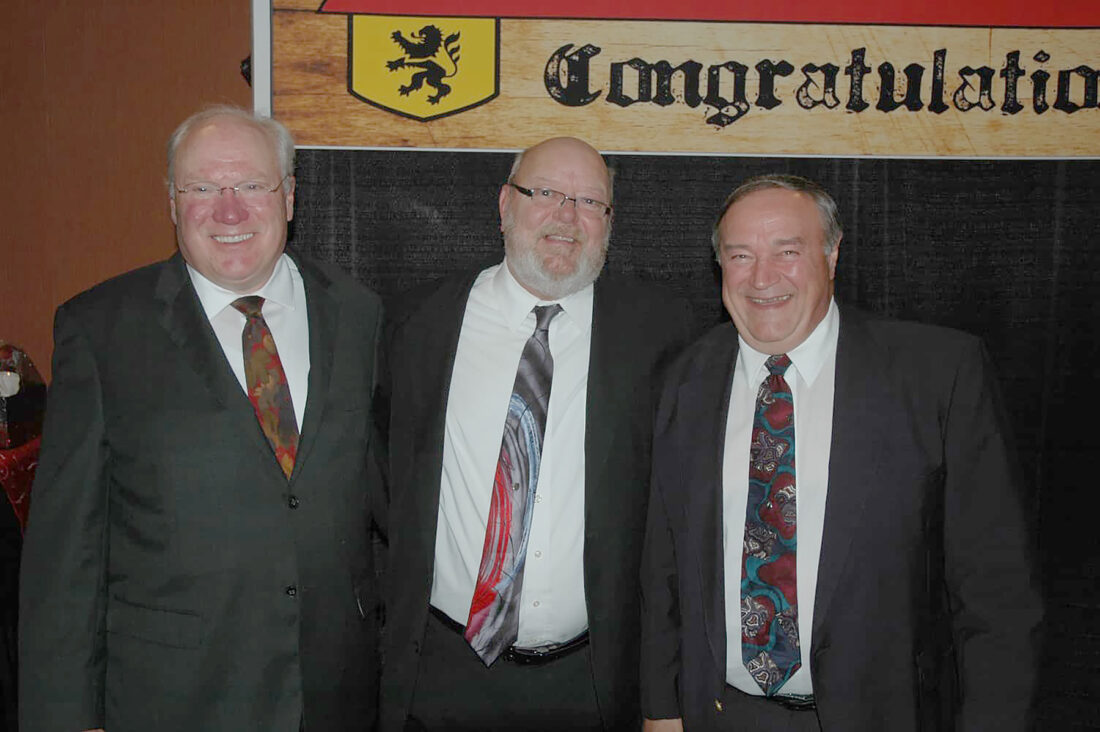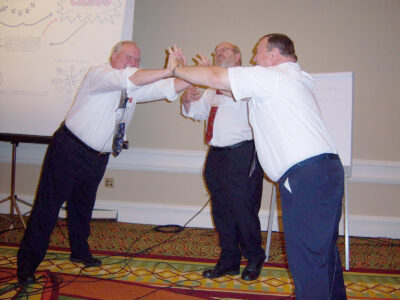BDD Training Associates teaches therapy worldwide
Business profile
- Stephen Buckbee, Daniel Doyle and Michael Dupont — who together operate BDD Training Associates — create a physical representation of a type of unhealthy family system, one in which people lean too heavily on each other instead of being able to stand independently. (Courtesy photo)
- From left, Stephen Buckbee, Daniel Doyle and Michael Dupont smile at the camera during a past event. The trio forms BDD Training Associates, which teaches therapy methods to various groups. (Courtesy photo)

Stephen Buckbee, Daniel Doyle and Michael Dupont — who together operate BDD Training Associates — create a physical representation of a type of unhealthy family system, one in which people lean too heavily on each other instead of being able to stand independently. (Courtesy photo)
ESCANABA — Three local men with backgrounds in social work conduct trainings for other therapists, businesses, family structures and more, plus deliver presentations in schools and other settings.
Under the business name BDD Training Associates Inc., Stephen Buckbee, Daniel Doyle and Michael Dupont apply the methods of Virginia Satir to help people overcome challenges, reach new status quos after disruptive changes and better care for themselves.
Buckbee first met Satir, a clinical social worker and therapist particularly known for her work with family systems, while he was working at Bay College. While the trio of BDD all have somewhat different backgrounds — Dupont began in the substance abuse field before moving into mental health; Buckbee was a social worker with Delta Family Services, then worked in the Comprehensive Employment Training program (a forerunner to Michigan Works) and for the Maniaci Center (which became Community Mental Health and is now Pathways) before becoming a counselor in the county jail; Doyle spent 13 years in the Army, was the director of a mental health outpatient center for an Indiana hospital, worked for the Maniaci Center and conducted group therapy at the jail — all taught social sciences at Bay.
Given the opportunity to see Satir herself, Buckbee took it.
“I had the summer off, and I went to Chicago to see her, and I was absolutely blown away,” he said. “I’d taken a look at all kinds of therapists all over the place, and I never saw anybody work like this woman. …She had something to say, and so I thought that would be the person I wanted to learn from.”

From left, Stephen Buckbee, Daniel Doyle and Michael Dupont smile at the camera during a past event. The trio forms BDD Training Associates, which teaches therapy methods to various groups. (Courtesy photo)
Buckbee trained with Satir for awhile and she asked him to join her organization and teach for the Avanta Network. However, not long afterwards, she died.
“But before she died, she said, ‘Go home and find a trio to teach (with),'” Buckbee said.
The dynamic he, Doyle and Dupont captured, and their application of Satir’s models, became useful first locally and the internationally.
The first job taken on by BDD Training Associates — named from the initials of each of the guys’ last names — was to train other professionals to provide therapy to youth status offenders through Regional Detention Support Services, or RDSS.
“The state’s intention was to stop kids from dying by suicide in jails,” Dupont put it simply.
“We started doing it around the state for rural probate courts. That’s what started us,” Buckbee said. “And then people started saying, ‘Could you do this or do that?’ But we were all employed, and so we did it on a part-time basis.”
Deborah Doyle became the bookkeeper for the business and has kept things in order ever since.
BDD found that Satir’s model for working with family systems had much broader applications when generalized. So many things are systems — whether they be family units, groups of coworkers, couples, or even individuals grappling within themselves.
“Over the years, we’ve taken the models to various different contexts. When people are asking for something, we ask them to define what they’re looking for, and then we create a program using a system model,” Buckbee explained.
The Satir change model involves incorporating a new, transformative idea into chaos caused by a foreign element, such as an unexpected life change. By integrating the new framework, a new status quo can be reached.
“Life is not the way it’s supposed to be. It’s the way it is. The way you cope with it is what makes the difference,” Satir has been quoted as saying.
The Avanta Network, which Satir founded as a training organization to teach social workers and psychologists about how to use her models, has since evolved into the Virginia Satir Global Network, with which BDD Training Associates are heavily involved.
“One of the wonderful things about Satir models is that they are universal. They just fit,” Doyle said.
Satir was known for her powerful presentations and actually performing therapy in front of a group as a means of teaching it.
“That’s something that we do at times depending on the group,” Dupont said.
Not only are Satir’s methods practiced around the world, their functionality has been proven through the success BDD Training Associates has seen in all sorts of environments.
BDD has conducting training for hypnotherapists in Scarborough, England, and active psychiatrists in Vancouver, British Columbia, but the people BDD trained for the RDSS program were just volunteers off the street. The triad has been hired by companies to hold workshops for their employees.
They had a program for police officers in Detroit that started off very prickly but ended up with cops hugging each other — “that was a beautiful experience,” Doyle said.
“One of the ones I really enjoyed is when we did the nurses and ER at OSF about how to deal with angry and violent people,” Doyle said. “They still talk about that. That was good training.”
In local schools, the BDD trio delivers a presentation called “A Conversation about Suicide” to students.
They’ve trained teachers and administrators how to intervene in difficult situations and refer kids who might be suicidal.
BDD has also traveled and taught Satir models in the Czech Republic, Hong Kong and China. Even across cultures, the methods apply.
Since COVID-19, some trainings shifted to online.
One training the trio has scheduled for early next year is on a model called the mandala, which represents “dimensions of being human.” Always in flux, those eight dimensions are spiritual, physical, intellectual, contextual, sensual, emotional, nutritional and interactional, according to BDD. In discussing the mandala, BDD explains how every dimension of a person is affected by trauma and how to nurture those systems by applying Satir methods.
Having now been in business together for 37 years, Buckbee, Doyle and Dupont have found that each of them brings something special to the table. They are friends, trust each other completely and enjoy working as a team.
But the real benefit of doing what they do is the effects of their teachings. Buckbee said that it’s rewarding to know their efforts have worked, like when people write letters to say they have been using what they learned from BDD.
Doyle said he gets a kick out of seeing the “aha” realization moment — “watching the lights come on” in someone’s face, he said — when a person understands something. “It feels really good to see that,” he said.
On the opposite side of the coin, the difficult part of their work is encountering people who think they can simply hire BDD to go in and “fix” something.
“Some groups and individuals have expectations for us that are impossible,” Dupont said.
As with any training or therapy, the work isn’t one-sided. A schoolteacher may deliver a lesson, but a student has to make an effort to receive the message. A physical therapist prescribes exercises, but the patient has to practice them.
Though BDD Training Associates gets most of their business from word-of-mouth, they can be contacted through any of the individual members of the trio or by email at sbuckbee@charter.net.
———
R. R. Branstrom can be reached at 906-786-2021, ext. 140, or rbranstrom@dailypress.net.






